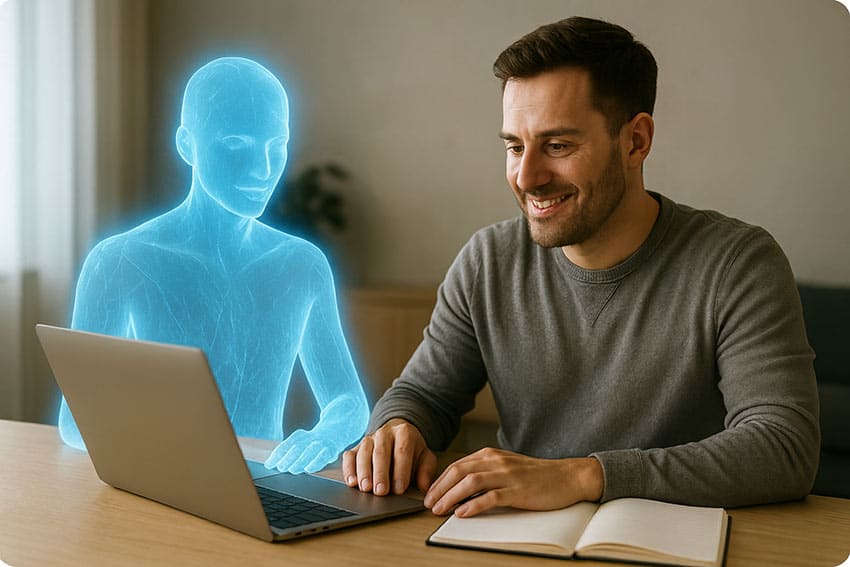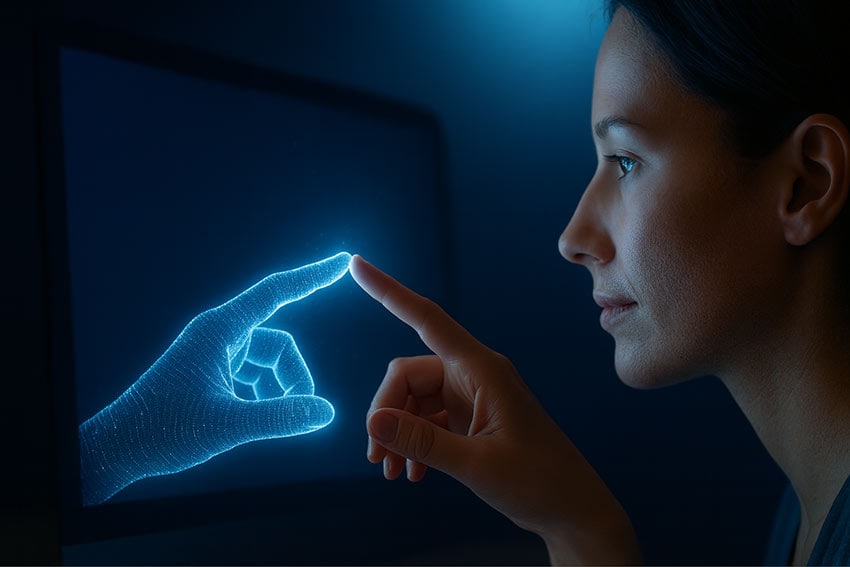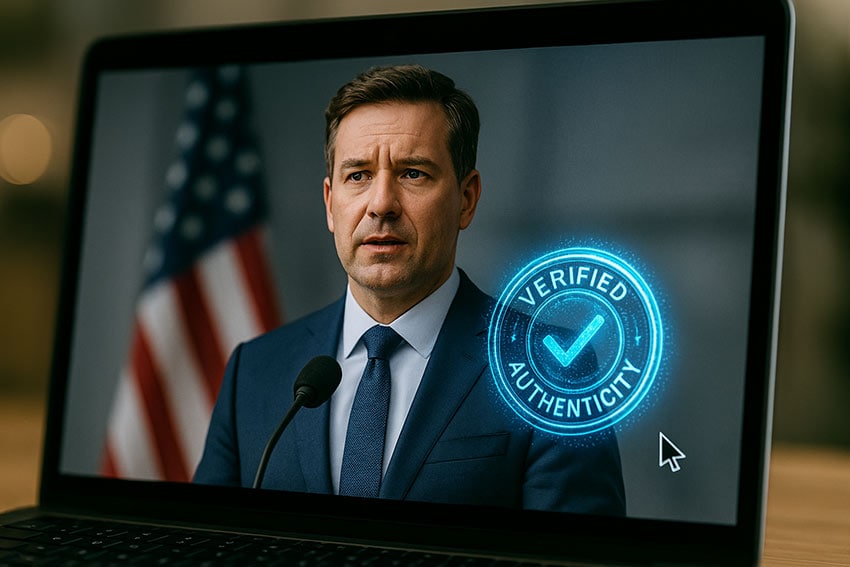Something profound is happening right now, and most of us are only beginning to realize how dramatically it will reshape our lives.
By 2030, just five years from now, your daily routines will look remarkably different. The way you work, learn, stay healthy, and even decide what’s true will all be transformed by AI in ways that feel both subtle and significant. If you’re reading this, you might feel excited about that possibility, anxious, skeptical, or simply overwhelmed by how fast everything seems to be changing. I get it. I’ve felt all of those things.
But here’s what I’ve learned from living and working with AI every single day as a small business owner and digital marketer: the future is far more empowering than it is scary. Yes, there will be challenges we’ll need to navigate together. But the opportunities are extraordinary. AI can help us do more, create more, and be more of who we truly are.
Whether you choose to embrace AI fully or just dip your toes in, understanding what’s coming will help you navigate it with confidence. So let me share with you what I’ve discovered, what’s likely ahead, and why I believe the future is something to look forward to, not fear.
The AI Partner You Didn’t Know You Needed
Let’s start with something that sounds almost too good to be true: imagine having a brilliant, tireless, non-judgmental partner who helps you think through problems, create things you never thought you could, and handle the mundane tasks that drain your energy.
That’s what AI has become for me. And it’s what it will become for millions of people in the next few years.

I used to spend days trying to organize my thoughts when working on a new project or ad campaign. I’d sit with a blank document, write something, delete it, write it again, get frustrated, and walk away. Then I started using ChatGPT to brainstorm with me. Not to do the thinking for me, but to help me clarify what I was trying to say. What used to take days now takes minutes. And the ideas that come out? They’re still mine, just better organized and more focused.
It’s the same feeling I had when I first created a voiceover using ElevenLabs. I was amazed. It sounded so natural, so polished, that I immediately thought of all those hours I’d spent re-recording the same sentence over and over, trying to get the inflection just right. Suddenly, I could iterate on content without the friction. I could test ideas faster. I could create more, because the barriers had dropped away.
Here’s what I want you to understand: AI isn’t replacing your creativity or your judgment. It’s amplifying it. It’s like having a co-pilot who handles the technical stuff so you can focus on what matters: the vision, the strategy, the human touch that only you can bring.
By 2030, this kind of partnership won’t be novel. It’ll be normal. Your AI assistant will know your preferences, your style, your goals. It’ll help you draft emails, plan your week, research topics you’re curious about, and even coach you through difficult conversations. And the best part? It won’t judge you for asking the same question five times or for needing help with something you “should” already know.
How AI Will Touch Every Part of Your Life
Let’s get specific about how AI will actually show up in the different areas of your life over the next decade.
Your Goals and Projects You know that home renovation you’ve been putting off because you can’t visualize how it’ll look? Or that business idea you’ve never quite figured out how to launch? AI will become your planning partner. It’ll help you break down overwhelming projects into manageable steps, research options you hadn’t considered, and even create visual mockups so you can see possibilities before committing. Whether you’re planning a garden, organizing a family reunion, or finally writing that book, AI will help you move from “someday” to “let’s start.”
Creative Expression If you’ve ever wanted to share your knowledge, tell your story, or create something but felt held back by lack of technical skills, that barrier is disappearing. Want to write a blog post but struggle with how to organize your thoughts? AI will help you structure your ideas while keeping your unique voice. Want to create videos to share your expertise but hate being on camera? AI tools can create professional videos from your script. Have a book inside you but writing feels overwhelming? AI can help you develop your outline, work through writer’s block, and refine your drafts while you provide the heart, the stories, and the perspective that only you can bring. The point isn’t that AI replaces creativity; it’s that AI removes the technical barriers that kept you from expressing what’s already in you.

Health and Wellness Your health data will become actually useful instead of just collected. Your smartwatch won’t just count steps; it’ll notice patterns you’d never catch and alert you to potential issues early. Dealing with a chronic condition? AI will help you track triggers, understand correlations, and communicate more effectively with your doctor. Mental health support will be more accessible through AI-powered therapy apps that provide cognitive behavioral techniques and coping strategies when you need them. And when you do see a doctor, AI will have already analyzed your symptoms and history, making appointments more efficient and diagnoses more accurate.
Managing Your Finances AI will be like having a financial advisor who knows your complete situation and goals. It’ll flag unusual charges, suggest better ways to allocate your budget, help you understand investment options in plain language, and even negotiate better rates on your behalf. Planning for retirement? AI will run scenarios based on your actual spending patterns and life goals, not generic assumptions. It won’t make decisions for you, but it’ll give you the information and insights you need to make smarter choices.
Your Home Through smart speakers, affordable smart devices, and AI apps on your phone, your home will start to anticipate your needs in ways that feel almost intuitive. And you won’t even need to buy a new house to experience this! Your AI assistant (accessible through devices you likely already own) will manage your schedule, remind you about appointments and reschedule them when conflicts arise, adjust your thermostat based on your preferences and the weather, and even suggest what to make for dinner based on what’s in your fridge and your dietary goals. Many of these capabilities will come through simple additions: a smart thermostat here, a connected appliance there, not complete home renovations.
Beyond the basics, your home will genuinely adapt to you. Your AI will learn when you prefer certain lighting, what temperature you like at different times, and even which rooms need attention based on how you use them. Maintenance becomes proactive instead of reactive. Your AI will remind you about filter changes, notice when appliances are showing early signs of problems, and schedule service before things break. It’s not about having a “smart home” as a status symbol; it’s about having a home that actually works with you instead of adding to your mental load.
Getting Around Even if your vehicle is a 2020 model, you’ll benefit from AI advancements. Your smartphone will provide AI-powered navigation that predicts traffic before it happens, suggests optimal departure times, and finds parking automatically. Many car manufacturers are already rolling out over-the-air software updates that add AI features to existing vehicles. Self-driving technology will be far more common in new vehicles, and for those who embrace autonomous vehicles, imagine reclaiming all that commute time for reading, working, or simply decompressing instead of fighting traffic.
Learning New Things Whatever you want to learn—a new language, a musical instrument, cooking techniques, home repair—AI will personalize the learning path to how you specifically learn best. It’ll adjust pace based on your progress, provide explanations in ways that click for you, and give you practice opportunities tailored to your skill level. It’s like having an infinitely patient tutor who never judges you for asking questions or needing something explained a different way.
Work and Income Whether you’re employed, self-employed, or retired with side income, AI will help you work smarter. It’ll handle routine tasks, help you communicate more effectively, provide research and analysis in minutes instead of hours, and free you up to focus on the work that actually requires your expertise and judgment. For retirees exploring freelance work or passion projects that generate income, AI lowers the barrier to entry significantly. You don’t need to be a tech expert or marketing guru; AI can help with those parts while you focus on what you actually want to do.
The common thread through all of this? AI handles the friction, the tedious parts, the technical barriers, and the information overload. You stay in control of the decisions, the creativity, the relationships, and the meaning. It’s not about replacing what makes us human. It’s about removing the obstacles that keep us from fully expressing our humanity.
The Elephant in the Room: Job Displacement
I know this is the part that makes people nervous, and I’m not going to pretend those concerns aren’t valid.
The truth is, work will change. Some jobs will evolve significantly. Some roles may disappear entirely. And yes, there’s a real risk that certain sectors of workers could be left behind if we don’t address this transition thoughtfully.

What I’ve experienced personally is that AI has made me more productive and creative, not obsolete. It handles the tedious parts of my work (the first drafts, the formatting, the repetitive tasks) so I can focus on strategy, relationships, and the creative work that actually requires human judgment. During one of my AI training sessions, I built a complete marketing asset live in front of a group of small business owners. When they realized they could do the same thing, you could see the relief and excitement. That’s empowerment.
But here’s what keeps me up at night: not everyone has equal access to learn these tools or the flexibility to adapt their careers. The people who will struggle most aren’t necessarily those whose jobs can be automated. They’re people who don’t have the resources, time, or support to learn how to work alongside AI.
That’s why it’s crucial that we (as a society) invest in accessible training, support workers through transitions, and ensure that the benefits of AI don’t just flow to those who are already advantaged. The technology itself isn’t the problem. How we choose to implement it, who gets left out, and whether we prioritize human dignity alongside efficiency are what will determine whether this transformation lifts everyone up or leaves too many behind.
I’m hopeful we’ll figure this out, but it’s going to take intention, not just optimism.
The Challenge We Can’t Ignore: What’s Real Anymore?
How many times have you watched a video and been astounded, only to discover it was AI-generated and not real at all?
Right now, we can mostly still tell when something is AI-generated. The voices have a slight uncanny quality. The images have telltale glitches. The videos don’t quite move naturally.
By 2030? That won’t be true anymore.
Deepfakes will be indistinguishable from reality. AI-generated content (articles, images, videos, audio) will be so sophisticated that our current methods of detection won’t work. Someone could create a video of a public figure saying something they never said, and it’ll look and sound completely real.
This is where things get tricky. And honestly, it’s the part that concerns me most.
We’re entering an era where verification will matter more than ever. We’ll need new tools and new habits to navigate a world where seeing is no longer believing. Already, companies are developing AI detection tools, digital watermarking systems, and blockchain-based authentication methods. By 2030, we’ll likely have standardized ways to verify the authenticity of content, similar to how we use SSL certificates to verify secure websites today.

But technology alone won’t solve this. We’ll also need to cultivate something more fundamental: critical thinking and healthy skepticism. Just like we learned not to believe every email from a “Nigerian prince,” we’ll need to develop new instincts for evaluating what we see online.
And here’s something I think will become increasingly valuable: personal trust and integrity. In a world where anyone can create anything, the people and sources we know to be reliable will become more important than ever. Your reputation for honesty and accuracy will be a currency all its own.
Will older adults struggle more with this? Probably. Will some people be fooled? Absolutely. But humans are remarkably adaptable. We figured out email scams. We learned about phishing. We’ll figure this out too.
The Choice Is Yours (But Changes Are Coming Regardless)
Here’s the reality: whether you choose to embrace AI or not, your life will be affected by it.
If you lean in, you’ll find tools that make you more productive, more creative, and more capable than you ever thought possible. You’ll have a tireless partner that helps you navigate complexity, learn new skills, and accomplish things that once seemed out of reach.
If you choose to avoid it, your life will still change, just in ways you have less control over. The world around you will be using these tools. The content you consume, the products you buy, the services you use, the healthcare you receive—all of it will be touched by AI. The question isn’t whether AI will be part of your future. It’s whether you’ll be an active participant in shaping how it affects your life.
I’m not saying everyone needs to become an AI expert. You don’t need to understand how the algorithms work any more than you need to understand internal combustion engines to drive a car. But I do think everyone benefits from understanding what AI can do, where its limitations are, and how to use it as a tool rather than fear it as a threat.
The Future Is Ours to Shape
As I write this in 2025, we’re standing at an inflection point. The next five years will determine not just how AI develops, but how we as individuals and as a society choose to integrate it into our lives.
We get to decide whether AI becomes a tool for empowerment or a source of division. We get to choose whether we use it to amplify our creativity or substitute for it. We get to shape whether it helps us connect more deeply with each other or isolates us further.
The technology itself is neutral. It’s what we do with it that matters.
My hope and genuine belief is that by 2030, we’ll look back on this moment and realize that all the anxiety and uncertainty was worth it. That AI didn’t diminish our humanity but enhanced our ability to express it. That it gave us back time, energy, and possibilities we’d forgotten existed.
The AI revolution isn’t something happening to us. It’s something we’re creating together. And I, for one, am excited about where we’re going.
So start now. Try an AI tool. Ask it questions. See what it can do. The future is bright, and it’s ours to shape.
_________________

